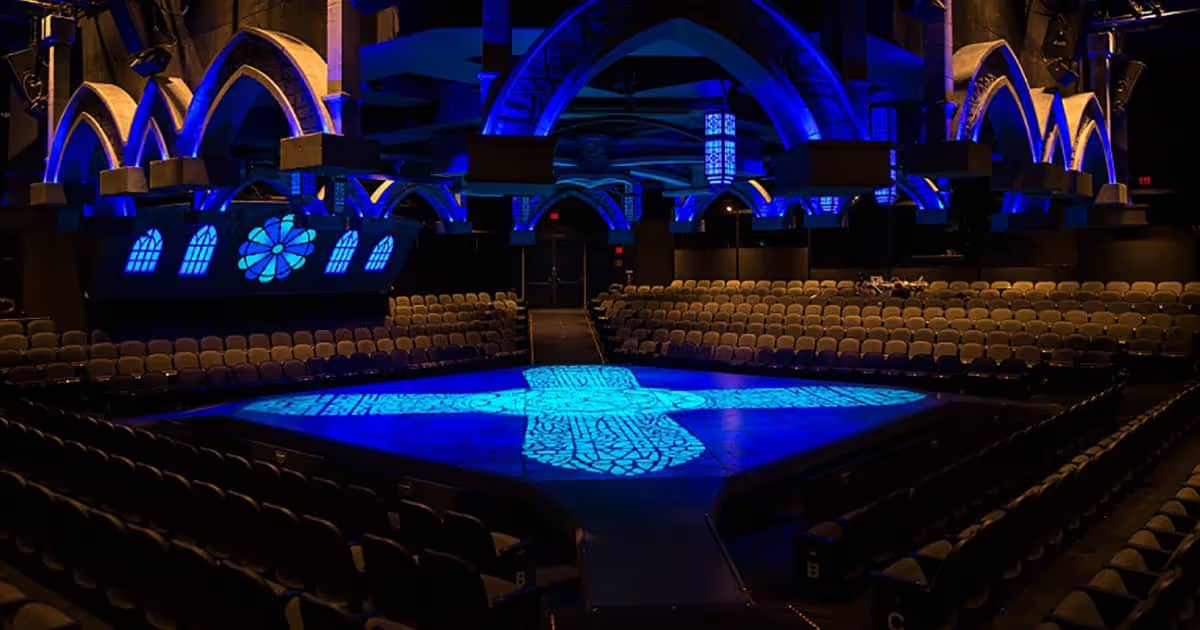‘The World Goes ‘Round’ puts fresh spin on Kander & Ebb showtunes
When the lights come up on the Marriott Theatre’s “The World Goes ‘Round,” the stage is in artfully curated disarray.
An upright piano tilted on end leans in one corner like an abandoned toy. A battered trunk and a jumble of fabric is piled in another. Red velvet curtains are draped high above, their grandeur diminished by unraveling threads that evoke a long period of disuse. A hodge-podge of ropes, sandbags and lighting fixtures — chandeliers, disco balls, candelabras — hangs above, as does a random crescent moon big enough to sit on.
That seemingly abandoned stage is quickly revived in director-choreographer Marcia Milgrom-Dodge’s production, running through Nov. 7 at the Lincolnshire venue.
The musical revue includes some two dozen songs from composer John Kander and lyricist Fred Ebb, drawing on their considerable catalogue of hits — “Chicago,” “Cabaret” and “Kiss of the Spider Woman” among them.
The nearly 45-year-old title tune’s relentless refrain is an apt opener. When Allison Blackwell begins the song, you can hear both the cruelty and the euphoria in the lyrics. The number ties both emotions to the same thing: the inexorable movement of a planet whose orbit remains relentlessly dependable, no matter the tragedies playing out on its surface.
Dodge’s five-person cast reanimates scenic designer Christopher Rhoton’s splendidly abandoned theater set with panache.
Take, for instance, Joseph Anthony Byrd’s explosive “Mr. Cellophane.” Usually the song from “Chicago” is a comedic performance by hapless cuckold, played as much for laughs as anything else. Byrd starts out that way, but rather than ending with a whimper, he escalates to a roar. “Mr. Cellophane” turns into a blazing anthem for the habitually unseen, undercounted and disregarded. It’s glorious.
Kevin Earley’s “Kiss of the Spider Woman” is equally intense. The Spider Woman character is a metaphor for death as the ultimate seducer, or so she was in Kander and Ebb’s Tony-winning 1992 masterpiece.
Dodge has Earley don an aggressively large ballgown, its skirt as large and round as a cathedral bell. As he sweeps across a stage bathed in red light, there’s menace and deliverance in the ominous lyrics.
Also memorable is the melancholic “I Don’t Remember You/Not a Day Goes By” duet. Earley and Byrd capture the ancient dynamic between the wanted and the wanter, Byrd heart-wrenching as he opens his heart, Earley turning away in search of someone else.
Dodge knows when to lighten the mood as well. Amanda Rose’s “Arthur in the Afternoon” is a sex-positive hoot with Rose embracing the zaniness as she peels off her persnickety white gloves and preaches the health benefits of squeezing in Arthur on the regular.
Nor does Meghan Murphy disappoint. With “Colored Lights,” she creates a bittersweet wonderland peopled by lost loves and impossibly romantic standards. She also shows off her Mae-West-meets-Carol-Burnett comedy chops alongside Blackwell in the campy “The Grass Is Always Greener.”
Music Director Ryan T. Nelson and longtime Marriott conductor/music supervisor Patti Garwood create a marvelous soundscape. Little touches from Garwood’s seven-piece orchestra (the insistent thrum of bass underlining Blackwell’s yearning, soaring “Maybe This Time”) and large ones (the manic, jangly discord of “Money, Money”) amplify the emotion packed into the lyrics.
Dodge’s choreography channels Bob Fosse (Rose in “All That Jazz”) as well Fred and Ginger (Byrd and Rose in “Shoes Dance”), playing to the strengths of her cast. Rose and Byrd are clearly the Fred and Ginger of the group, but the five can sell a kick line with verve to spare...











